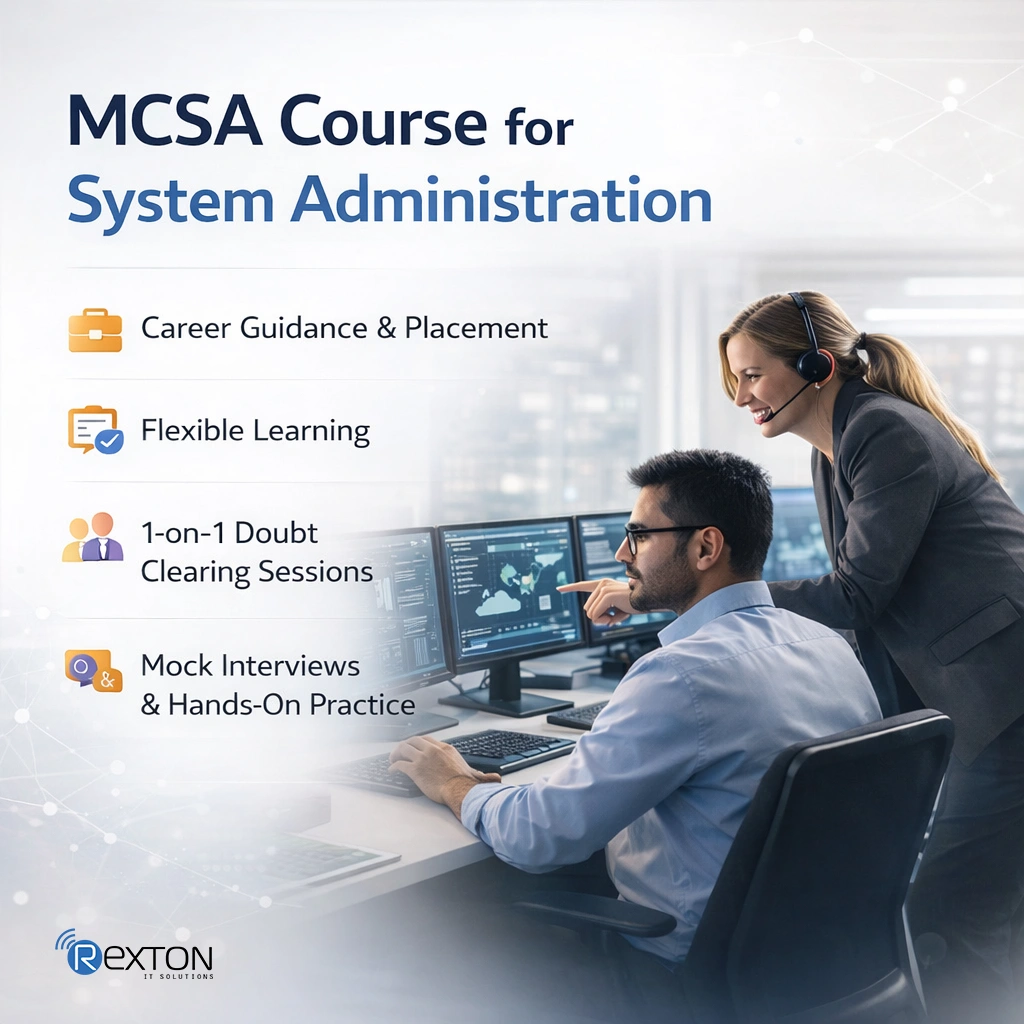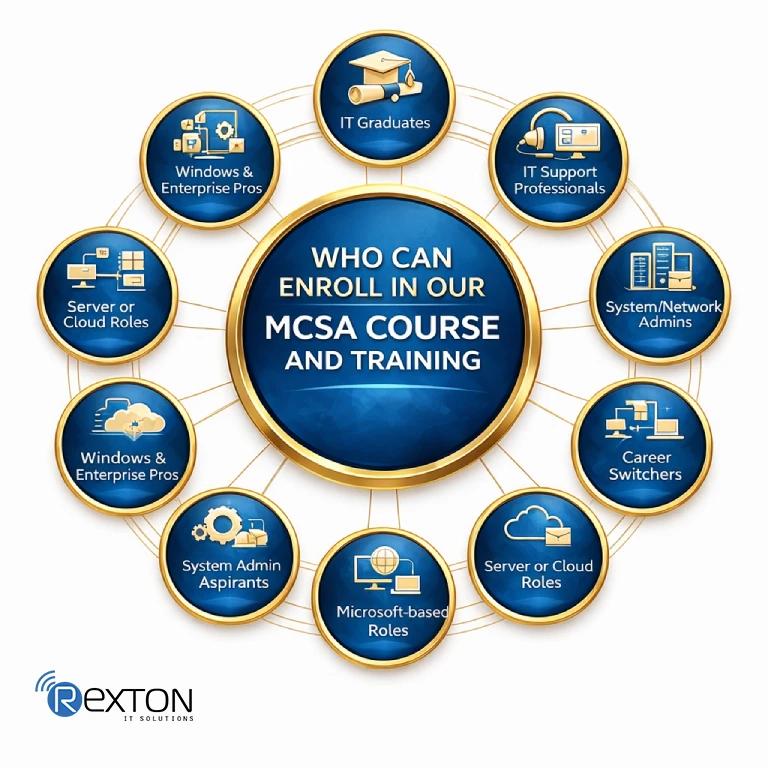Microsoft Certified Solutions Associate – MCSA Course for System Administration Roles
The MCSA course from Rexton IT Solutions provides comprehensive training to help you land entry-level roles at your dream organization. This course will start from Windows Server fundamentals and will proceed to advanced topics, including Hybrid integration, Server Monitoring, Virtualization, and more. Moreover, our MCSA course takes a practical approach and primarily focuses on skill development.
Enroll Now

Book A Demo Class
Why Is This MCSA Course Different?
- Career Support – Get career guidance from industry experts and access multiple job opportunities through placement drives
- Flexible Learning – Learn at your own pace with online learning modules
- 1-on-1 Training – Clear all your doubts with personalized doubt-clearing sessions
- Mock Interviews – Interview preparation at the course’s end to be job-ready
- Continuous Learning – Access the courses anytime from anywhere for a lifetime
- Practical Learning – Develop practical skills with hands-on experience
- Online Classe : Easily accessible online classes that make learning more flexible. Access the course content from anywhere and continue learning from home or any place convenient for you.
- Offline Classes : Our interactive offline classes with experienced faculty will provide you with deeper insights and advanced lab sessions.
- Doubt Sessions : Attend special doubt sessions with experts and ask all your doubts. This will help in building the necessary foundation for advanced learning.
- Covering the latest curriculum, including all the crucial technical updates
- Providing learning through a practical approach with labs and assignments
- Grow your career in server administration, network infrastructure, and computer networking
- Covering beginners to advanced topics, helping both experienced and new candidates
- Assessments after every module and chapter to help grasp the key concepts better
- Doubt session for candidates so that they can revise tough modules
Why Choose Rexton IT Solutions for MCSA Training Online
Our experts have designed this MCSA course prioritising practical learning. Consequently, the whole course focuses on skill development through assignments, assessments, and work on real-world problems. By the end of the course, you will have job-ready skills and a strong resume, which will significantly enhance job opportunities for you. Rexton IT Solutions stands out from the rest of the courses with:
Training Features
Job-Oriented Learning
Even without the MCSA Certification, enrolling in this course will provide you with job-ready skills. That is what job-oriented learning at Rexton IT Solutions means. Modern recruiters not only look for skills on your resume, but also check if you have practical hands-on experience. We aim to strengthen your resume by adding hands-on experience with Windows Server Administration tools and software applications. Moreover, this course will help you prepare for entry-level and intermediate roles in core IT infrastructure.
Join Rexton IT Solutions and grow your career in the right direction with the expert’s supervision.


Who Can Enroll in our MCSA Course and Training
- Fresh graduates from IT, computer science, or related fields
- IT support/helpdesk professionals looking to upgrade skills
- System or network administrators at a junior level
- Career switchers entering the IT infrastructure domain
- Anyone with basic computer and networking knowledge
- Aspirants aiming for a career in system administration or IT infrastructure
- Professionals who work with Windows Server, Active Directory, and enterprise networks
- Candidates preparing for server, cloud, or Microsoft-based roles
- Those seeking a strong foundation before advanced certifications (Azure, MCSE-style paths)
Start to Success
Like the Career Path? Enquire Now
What Do You Need to Know Before Enrolling in the MCSA Course
As stated earlier, there are no strict prerequisites to enroll in the MCSA Course. However, this course will cover advanced Windows Server concepts, including virtualization and security. Hence, having a fundamental knowledge of the following will significantly improve your learning curve:
- Basic computer knowledge (Windows OS, file systems, user accounts)
- Fundamental networking concepts (IP addressing, DNS, DHCP – basics are enough)
- Understanding of IT concepts like servers, clients, and domains
- No mandatory certification is required to start the course
- Prior exposure to CCNA or basic networking is helpful but not compulsory.
- Module 1: Introducing Windows Server
- Module 2: Implementing and configuring domain controllers
- Module 3: Managing objects in AD DS
- Module 4: Advanced AD DS infrastructure management
- Module 5: Implementing Group Policy
- Module 6: Managing user settings with Group Policy
- Module 7: Securing Active Directory Domain Services
- Module 8: Deploying and managing AD CS
- Module 9: Deploying and managing certificates
- Module 10: Implementing and administering AD RMS
- Module 11: Implementing AD DS synchronization with
- Module 12: Monitoring, managing, and recovering AD DS
- Module 13: Planning and implementing an IPv4 network
- Module 14: Implementing DHCP
- Module 15: Implementing DNS
- Module 16: Implementing and managing IPAM
- Module 17: Remote access in Windows Server
- Module 18: Implementing VPNs
- Module 19: Configuring advanced networking features
- Module 20: Configuring Local Storage
- Module 21: Implementing enterprise storage solutions
- Module 22: Implementing and configuring Hyper-V and virtual machines
- Module 23: Deploying and managing Windows and Hyper-V contain
- Module 24: Overview of high availability and disaster recovery
- Module 25: Implementing failover clustering
- Module 26: Implementing failover clustering Hyper-V
- Module 27: Implementing Network Load Balancing
- Module 28: Creating and managing deployment images
- Module 29: Managing, monitoring, and maintaining virtual machine
| Exam Name | Exam Code | Fee |
|---|---|---|
| Administering Windows Server Hybrid Core Infrastructure | AZ-800 | INR-4865 |
| Configuring Windows Server Hybrid Advanced Services | AZ-801 | INR-4865 |
| Azure Administrator Associate | AZ-104 | INR-4865 |
| Azure Security Engineer Associate | AZ-500 | INR-4865 |
| Cybersecurity Architect Expert | SC-100 | INR-4865 |
Course Features
Our comprehensive MCSA Course includes the following materials:
Book A Demo Class
Benefits of Our Comprehensive MCSA Course and Training

High-Paying Role after MCSA training
| Job Role | Typical Responsibilities | Average Salary in India (₹ / Year) |
|---|---|---|
| System Administrator / Windows Server Administrator | Manage Windows servers, Active Directory, backups, user access, and system performance | ₹3.5 L – ₹9 L |
| Network Administrator | Maintain LAN/WAN networks, monitor connectivity, configure switches and firewalls | ₹4 L – ₹8 L |
| IT Support / Help Desk Engineer | Handle system issues, user support, software installation, and troubleshooting | ₹3 L – ₹6 L |
| Cloud Administrator (Azure-focused) | Manage virtual machines, cloud services, storage, and monitoring | ₹5 L – ₹12 L |
| Security Analyst (Entry–Mid Level) | Monitor system security, apply patches, and perform basic threat analysis | ₹5.5 L – ₹10 L |
| Database Administrator (SQL Server) | Manage databases, backups, performance tuning, and access control | ₹4.5 L – ₹8 L |
| Virtualization / Infrastructure Engineer | Handle Hyper-V/VMware environments, server consolidation, and infrastructure planning | ₹6 L – ₹14 L |
| SCCM / System Center Administrator | Deploy software, manage enterprise systems, automate updates | ₹5 L – ₹10 L+ |
| IT Consultant / Infrastructure Specialist | Design, upgrade, and optimize IT infrastructure for organizations | ₹6 L – ₹15 L+ |

Our Recently Placed Students





Frequently Asked Questions
- Builds a strong foundation in Windows Server and system administration.
- Enhances your skills in networking, Active Directory, and virtualization.
- Improves your chances of landing IT admin and support roles.
- Validates your technical expertise with a recognized Microsoft credential.
- Helps you transition to advanced Microsoft certifications, such as Azure.
Enrolling in Microsoft training courses can transform your career in the following way:
- Strengthens core IT and cloud skillsets.
- Boosts credibility with globally recognized certifications.
- Improves job prospects in system and cloud roles.
- Helps you stay up to date with the latest Microsoft technologies.
- Enhances problem-solving and technical troubleshooting skills.
Yes, absolutely. The MCSA course by Rexton IT Solutions is flexible and allows for self-paced learning. You can learn and work simultaneously with our online classes. Also, our separate doubt-clearing sessions will help you revisit complex topics for a comprehensive understanding.
Windows Server certificates help IT professionals and entry-level candidates in multiple ways. Some of the key ones are listed below:
- Validates your expertise in managing Windows Server environments.
- Enhances your skills in Active Directory, virtualization, and networking.
- Improves your chances of landing system admin and server admin roles.
- Strengthens your ability to troubleshoot and secure server infrastructures.

